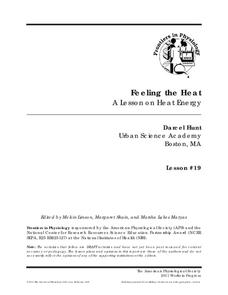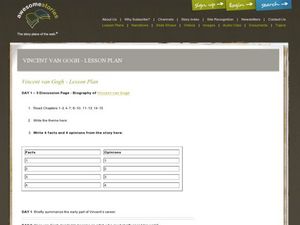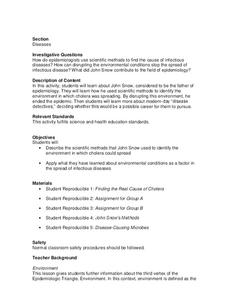American Physiological Society
What Environmental Conditions Lead to the Hatching of Brine Shrimp?
Will changing the environment in which brine shrimp live impact their reproductive success? Young scientists get hands-on experience studying the habitat of brine shrimp in a two-week immersion lesson. The teacher's guide provides all of...
American Physiological Society
How Does the Density of a Liquid Affect the Buoyancy of an Object?
Here's a lesson plan that will really float your boat! Introduce physical science scholars to the relationship between buoyancy and density through an assortment of individual and collaborative exercises. Lab groups work together to...
American Physiological Society
Why is Kettle Corn Cooked in Copper Pots?
The kitchen — it's not just for eating anymore! Specific heat is often a difficult concept to grasp, so give it context by relating it to cooking. Learners gain experience in the principles of thermal energy transfer by designing an...
American Physiological Society
Sit On It
How do product designers come up with the variety of things we see in stores and on TV every day? They identify a need, then create something that meets that need. Sounds simple, right? A two-week lesson puts seventh graders in that role...
American Physiological Society
Feeling the Heat
How do the changing seasons affect the homes where we live? This question is at the forefront of engineering and design projects. Challenge your physical science class to step into the role of an architect to build a model home capable...
Missouri Department of Elementary
My Feelings
Encourage self-awareness with a lesson that challenges scholars to identify feelings—happy, sad, mad, and scared. Using a feelings thermometer, similar to that of a bar graph, pupils discuss how they would feel in specific scenarios then...
Curated OER
Wildflower Beautification Project
Learners, in cooperative groups, design and create a wildflower garden for the community. They write letters to property owners requesting use of their land and then write invitations to their parents and to local, state, and federal...
Curated OER
Understanding Points of View
Develop an understanding of point of view in your young learners. Read narrative stories to your class and discuss who the storyteller is. Point out different points of view and discuss new vocabulary in order to introduce this concept....
Curated OER
Awesome Stories: Vincent van Gogh
Who was Vincent van Gogh? Most of the questions can be answered in two or three sentences; however, there is at least one essay prompt and one personal response question that require longer answers. Questions call for a good mix of...
Curated OER
Teacher Appreciation Week (Elementary)
Primary writers will create a persuasive essay about Teacher Appreciation Week. Additionally, they will select a quote from a famous person and write a persuasive essay about how it relates to one of their favorite teachers. In the end,...
Curated OER
Community Helpers
Community Helpers are the focus of this sociology lesson. Learners brainstorm the many different jobs done in their community, discuss why they are necessary, and think of ways they can be community helpers.
Curated OER
Welcome to My World
Elementary schoolers discuss what a community is, and what their community has to offer them. They create posters, or flyers for the different businesses or places in their community to place around their school. After the students have...
Curated OER
Living and Non-Living Things in the Environment
Third graders examine living and non-living things and observe a plant growing in the classroom. There are many additional resources to assist learning and extension work, they can read books, interact with PowerPoint presentations, and...
Curated OER
How Much is Dirt Worth?
Dirt is worthless, isn't it? Find out the true value of dirt, and by dirt I mean soil. The class explores what makes soil, the types of soil, and what happens when soil becomes void of its nutrients. There are several great activities,...
Curated OER
The Quicker the Better? Food Processing
Kids explore food choices, nutrition, and agriculture through a variety of sources and activities. They research unknown words on food labels, test the salt content in canned vs non-canned foods, and discuss processed foods. The lesson...
Agriculture in the Classroom
Understanding the Columbian Exchange Through Old World and New World Foods
If you're interested in teaching your class about the impact of the Columbian Exchange on contemporary society, this is worth a look. The plan begins with an introduction to the topic, which stems from a cell phone poll...
Agriculture in the Classroom
Growing a Nation (1930-1949): From Defeat to Victory, Lesson 2
Using primary source materials including radio broadcasts, films, and interview transcripts, history high schoolers gain a better understanding of the Dust Bowl, relief efforts for farmers, and the nation's agricultural past. It includes...
Agriculture in the Classroom
Growing a Nation (1950-1969): Prosperity & Challenges: The Story of American Agriculture
A wonderful activity on the development and impact of mechanized farming! History or agriculture classes learn the historical background of the United States' food production by creating a pamphlet with information on the cause and...
Agriculture in the Classroom
Growing a Nation: Into a New Millennium 1970-Present
If you want to focus on critical thinking skills, this well-constructed series of activities will challenge your history or agriculture class to evaluate the effectiveness of administrative decisions related to agricultural and the...
Curated OER
The Life and Work of Vincent Van Gogh
Vincent Van Gogh is a fascinating subject for students of art history.
Curated OER
Alfonso Ball
Joey Alphonso made up this game, which is played using a gator skin ball and a tennis racket on a basketball court. The simple rules and strategy of the game are explained. This is a high-scoring, run around activity. Everyone can...
DePaul University
Bold Plans, Big Dreams, City Progress
Determining which statements represent fact or the author's opinion in an integral part of reading informational text. Encourage seventh graders to read a passage about Barack Obama and the city of Chicago, as well as a passage focused...
Centers for Disease Control and Prevention
Diseases
During a cholera outbreak, scientists presented two theories; one theory was based on miasma and the other on germs and contaminated water. The lesson looks at the scientific process for finding the real culprit.
Global Oneness Project
Deconstructing Consumerism
To increase awareness and launch a discussion of consumerism, class members view What Would It Look Like, a 25 minute film of images that capture the global effects of the consumption of goods. Viewers make a list of the images that they...
Other popular searches
- Health Careers
- Career Choices in Health Field
- Math for Health Careers
- Health Careers Powerpoint
- Health Careers Planner
- Technology in Health Careers
- Investigate Health Careers
- Therapeutic Health Careers
- Health Careers Facilities
- Science and Health Careers
- Health Sciences Careers
- Health Career Clusters

























